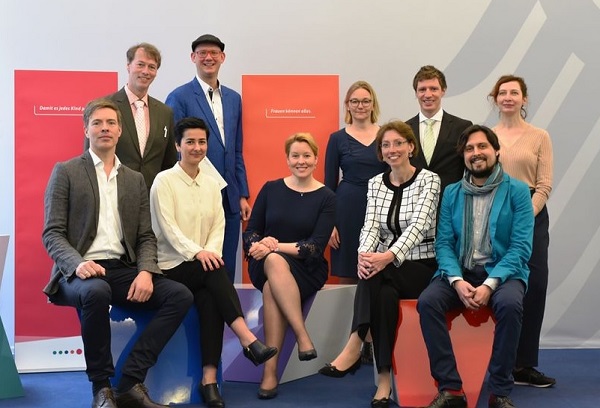JKU researcher Thomas Gegenhuber co-authored the expert review about the German government's report.

During the first quarter of 2021, German Federal Minister Franziska Giffey received a report by the commission of experts for the Third Report on Gender Equality titled "Digitalisierung geschlechtergerecht gestalten". The report focuses on what courses of action should be taken to shape developments in a digital economy and society in a way that both women and men have equal realization opportunities. Thomas Gegenhuber, a researcher at the Institute of Organization Science at the JKU and junior professor of business (focus on digital transformation) at Leuphana University Lüneburg, is a member of the commission as an expert for business-related issues. His work in the report focused primarily on the topic of “Digitalisierungsbezogene Gründungen”.
Apps, digital platforms, artificial intelligence, service robotics - many start-up companies include digital technologies in order to create innovative business models. Prof. Dr. Thomas Gegenhuber remarked: "Surveys show that only about 15.7% of German start-up companies are created by women. Digital entrepreneurship will build the economy of the future. The situation does not look much better in Austria. According to an IMAS/WKÖ study, the percentage of women entrepreneurs in technological areas of the future was 18%. If we want to shape the future economy in a gender-equitable way, we need to focus on increasing the proportion of women now."
What role does gender inequality play when it comes to start-up companies? The report indicates that there are structural barriers responsible for a gender ratio imbalance in the digital start-up scene. These include the influence of gender stereotypes and a lack of opportunities to balance work and family responsibilities. Start-up capital is also not equally available to everyone: men are more likely to receive venture capital funding, funding by private investors, or even government funding than women are. According to international studies however, women have proven to be more financially sustainable entrepreneurs.
Gegenhuber added: "If we want to see more start-up companies in the tech sector, we need a larger share of programmers and/or people who have programming skills. Austria also needs to become more innovative in this area; there are a number of informal coding communities that teach programming skills to thousands of women on a voluntary basis. The state should provide targeted funding for these groups. HTW Berlin is currently conducting a bold experiment in the formal education sector and the computer sciences and business degree programs for women are proving to be very popular among female students. The new digital university in Upper Austria could also take a lesson from this approach."
In regard to changing the male-dominated image of "entrepreneurship," Prof. Thomas Gegenhuber believes universities have an obligation: "When we invite entrepreneurs as speakers or organize university discussions, we as educators must make sure to invite women as well as men. When it comes to best practice examples in teaching, we also have to pay attention to diversity."








